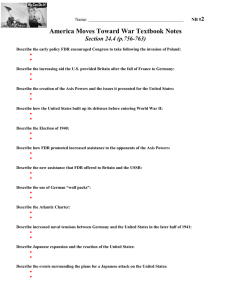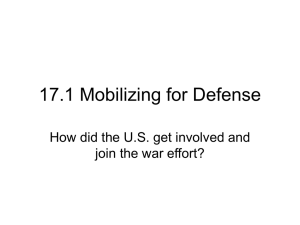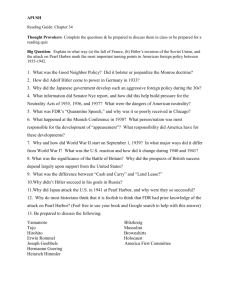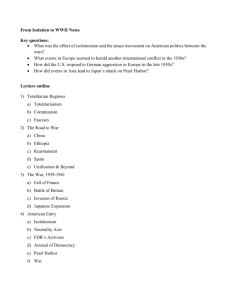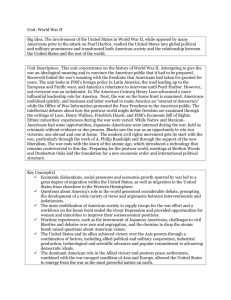Document 9917736
advertisement
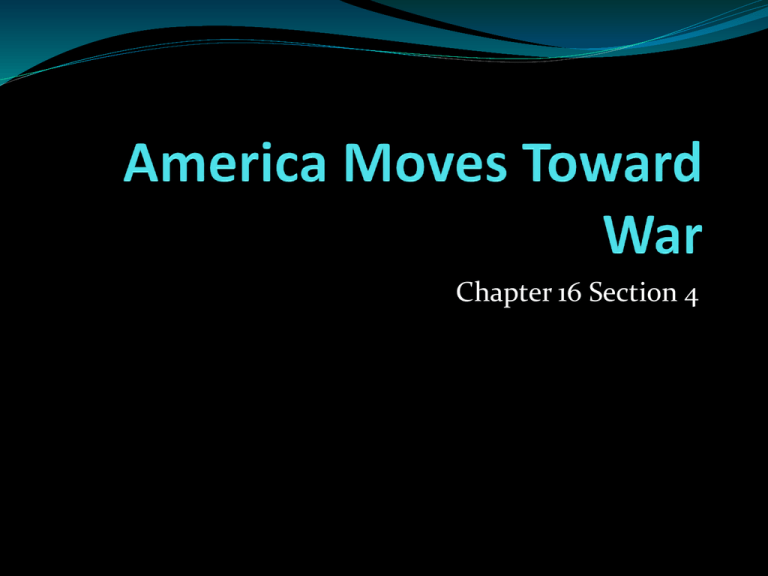
Chapter 16 Section 4 United States Helps the Allies Cash and Carry Policy (1939)- allies could buy ships and supplies, but had to transport them on their own ships. Lend-Lease Act (1941)- President could lend arms/ships to allies (Britain was too poor). 1. Hitler ordered U-Boats to sink ANY supply ships (“wolf packs”). 2. FDR ordered navy to sink any German subs. 3. Used the convoy system used during WWI. 4. Response to the Battle of Britain Building US Defenses FDR asked Congress to increase spending for national defense. Selective Service and Training Act- 1st peacetime military draft 1. All men ages 21-35 registered 2. ONLY served in the Western Hemisphere *Election of 1940- FDR defeats Wendell Willkie due to the fact they both preferred the same policies. 1. First and only President to serve more then 2 terms. 1. Four Terms total Atlantic Charter Atlantic Charter- agreement between Churchill and Roosevelt. 1. Free trade 2. right of people to choose own govt. 3. Allies’ peace plan for end of WWII. 4. US didn’t have to declare war. Japan Prepares to Attack Hideki Tojo- leader of Japan Took over China and SE Asia Japan controlled ALL of East Asia 2. US responded with an oil embargo (trade refusal) which REALLY hurt Japan. *US knew Japan was going to attack, but wasn’t sure when or where. 1. Japan Negotiated fake peace proposals 1. Pearl Harbor December 7, 1941- “a day that will live in infamy” (FDR) Attacked very early on a Sunday morning at the military base Pearl Harbor (Hawaii) 180 airplane attack 1. 2,403 died and 21 ships sunk (8 battleships) 2. Japan’s goal- cripple the US fleet so they couldn’t stop Japan in the PACIFIC *ALL but one member of Congress votes to declare war after the attack. Pearl Harbor Actual Footage: http://www.youtube.com/watch?v=3e99lfmmDN0 Pearl Harbor: http://www.youtube.com/watch?v=aYHgCPmGnAg Chapter 17 Section 1 Preparing for War Japan expected America to be afraid and avoid conflict after Pearl Harbor 5 million volunteers not enough Draft expanded and 10 million drafted 1. Only 8 weeks of training. Role of Women *George Marshall- founded Women’s Auxiliary Army Corps (WAAC) in 1942 1. Women could serve in noncombat army roles for status and salary, but not equal benefits 2. Nurses, ambulance drivers, radio operators, and pilots *Many women also worked in factories. Role of Minorities *African Americans, Hispanics, Native Americans, and Asian Americans served, but often faced discrimination and rarely saw combat. A. Philip Randolph- marched to D.C. with several African Americans protesting racism in factory hiring and the military. 1. FDR issued an executive order calling on employers and labor unions to stop discriminating. How US Mobilized for WWII Total War (cars to planes and tanks) Factories focus on making weapons/war supplies and not much else. 2. Rosie the Riveter- symbol for women working in factories (men=soldiers, women=factories) 3. Propaganda Posters (similar to WWI) 1. Government Regulation Office of Price Administration (OPA)- set prices on many goods. Raised and extended the income tax. Did NOT cut workers’ wages War Production Board (WPB)- ordered some factories to produce war materials and some to produce consumer goods. 1. Organized drives to collect supplies like scrap iron, rags, cooking fat, etc. Rationing Rationing- establishing fixed amounts of goods deemed essential for the military. 1. People received ration coupon books used to buy scarce materials (limited in how much they could buy) 2. Fuel rationing (less driving, carpooling, etc) Chapter 17 Section 4 Economic Gains Unemployment fell to a 1% low Pay up 10% Could profit from buying war bonds Farmers benefitted from higher prices and better weather (x3 $) Women got good factory jobs, but most had to give them up after the war. Many migrated to North and Cal for jobs Social Changes More single mothers (husbands fighting) Increased marriages (marry before fighting) GI Bill of Rights- provided education and training for veterans paid for by the govt. 1. Provided farm and home loans for soldiers *James Farmer- founded Congress of Racial Equality (CORE) 1. Protested segregation and 3 day race riot in Detroit *Zoot suit fad with Mexican Americans- beat up
